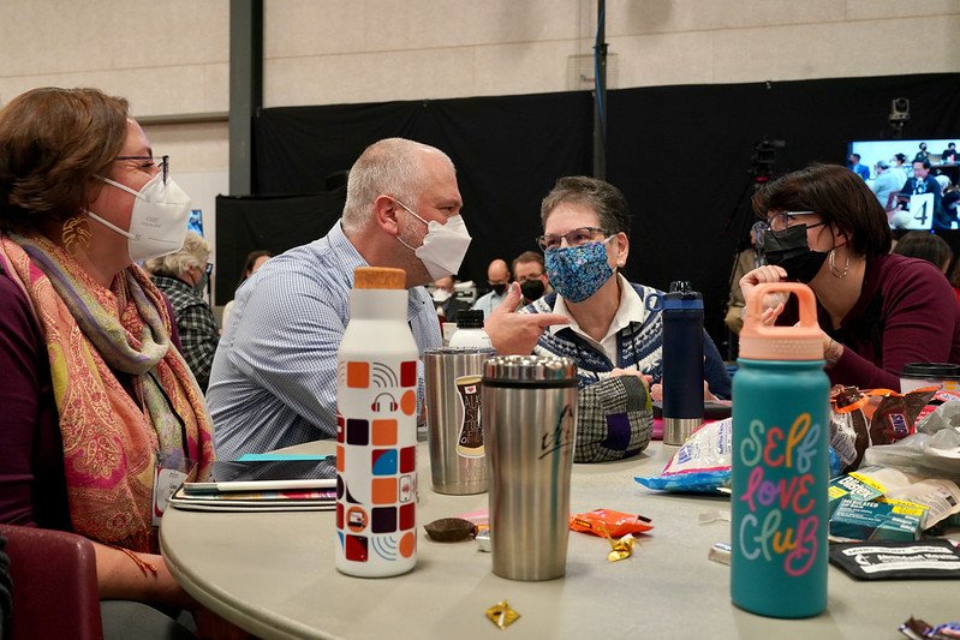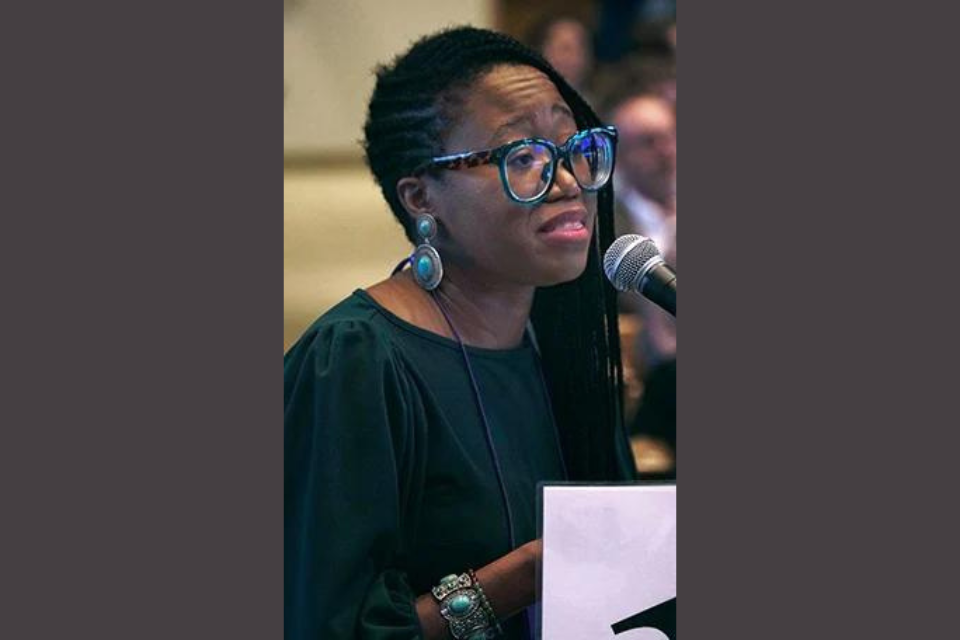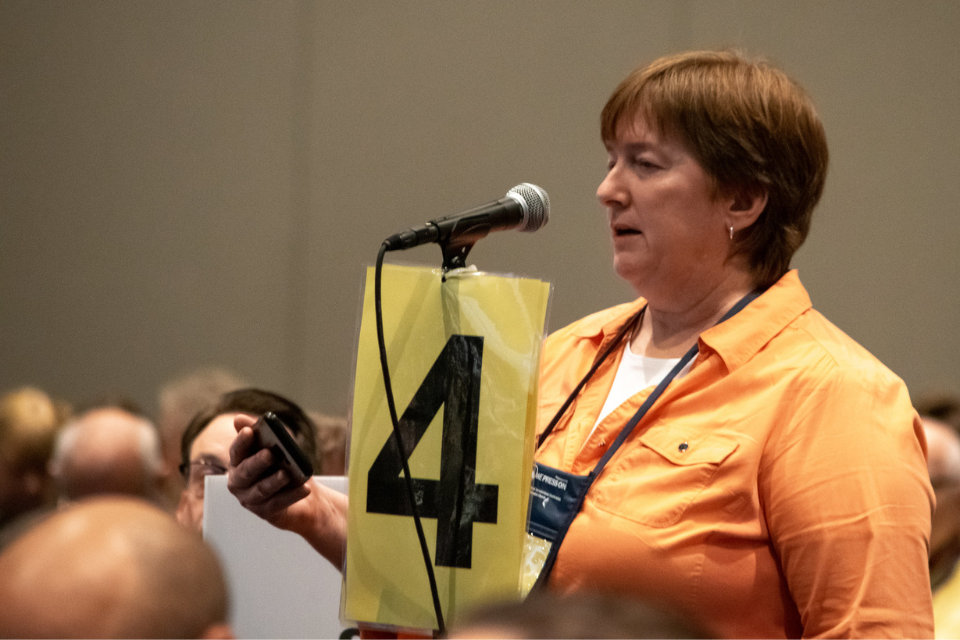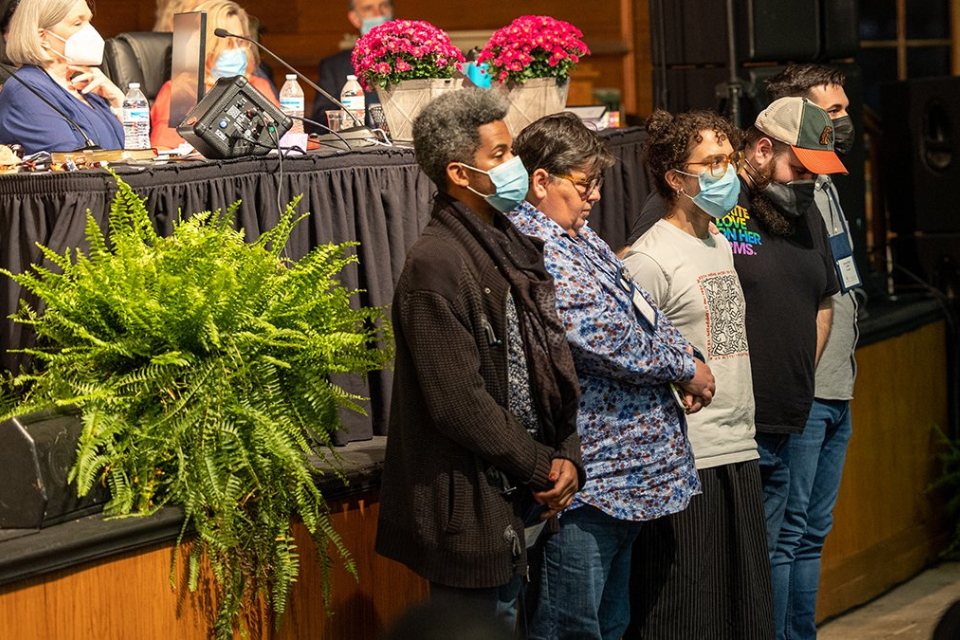Three resolutions were overwhelmingly supported by the five U.S. jurisdictions of The United Methodist Church, signaling a new way forward as the church looks toward the 2024 General Conference and the denomination’s future.
CYNTHIA ASTLE
Editor, United Methodist Insight
Months of conversations among jurisdictional conference delegates resulted Nov. 2-4 in a historic event when all five U.S. regions approved three resolutions that repudiate The United Methodist Church’s past and point the way toward a more inclusive future.
While the resolutions aren’t binding on jurisdictions or annual conferences, their topics and the strong majorities by which most were approved signify that a clear shift has taken place, say United Methodist leaders. Furthermore, conference delegates foresee that the process by which they worked across jurisdictional lines portends more grassroots activism ahead of the 2024 General Conference, the UMC’s worldwide legislative assembly now slated to take place April 23–May 4, 2024, in Charlotte, N.C.
While the resolutions’ language varied depending on the jurisdiction, partly because of early submission deadlines, the topics cover three issues uppermost in the minds of UMC leaders:
- Endorsement for the Christmas Covenant global regionalization proposal written by international United Methodists, aiming toward greater contextual autonomy for non-U.S. regions; reducing the U.S.-centric nature of General Conference; and establishing the U.S. church as a region along with other geographic areas. (Read the resolution adopted by North Central Jurisdictional Conference delegates: 123, yes; 21, no.)
- Encouragement for delegates to work toward full inclusion for LGBTQ persons in the UMC, a resolution authored by self-identified “queer” delegates. (Read the resolution adopted by North Central Jurisdictional Conference delegates: 129, yes; 23, no.)
- Ensuring the integrity of the UMC’s future by asking those who plan to leave the denomination to remove themselves from any further leadership roles. (Read the resolution adopted by North Central Jurisdictional Conference delegates: 114, yes; 32, no.)
For the Rev. David Livingston, one of the facilitators of the grassroots effort, the resolutions represent both a final repudiation of the 2019 General Conference’s tightened LGBTQ bans and a roadmap toward the UMC’s future.
Epilogue to 2019 General Conference
“The 2022 Jurisdictional Conferences were a kind of epilogue to the 2019 General Conference,” Rev. Livingston said in a telephone interview with United Methodist Insight.
In 2019, traditionalist delegates eked out a narrow victory tightening the penalties for violating the UMC’s bans on ordaining LGBTQ clergy and performing same-sex marriage.
“There was a large backlash to what General Conference adopted,” Rev. Livingston said. “It felt mean, and we’re not mean people.”

The Great Plains Conference clergy delegate described the 2019 annual conferences’ elections as “a reaction to what the right wing of the denomination had done at General Conference.”
“Delegates elected in 2019 came to 2022 jurisdictional conferences with a clear mandate from those who elected them,” Rev. Livingston said. “The 2019 delegates were elected to choose bishops to help move the denomination forward and the resolutions were part of that work.”
“The delegates who voted for the resolutions aren’t all theological progressives but they’re in favor of full inclusion,” he added. “You can support inclusion without being progressive theologically. This was true across all five jurisdictions.”
Rev. Livingston said he was impressed by the wide margins of support shown in the most of votes approving the resolutions.
“I was surprised the resolutions flew under the radar as much as they did,” he said. “It wasn’t by design; there was a lot of coordination among the groups we were working with. We didn’t tell people not to talk about it.”
“But the vote margins made it clear the resolutions were part of what people thought they were elected to do. I can’t speak to the other jurisdictions, but in South Central we had vote margins like 130 to 30. That can’t happen unless people know what’s going on.”
Documenting a Shift
Laura Young, a deaconess from the Texas Annual Conference, said the resolutions were a cooperative effort in which interjurisdictional organizing teams drafted the documents. An organizer for Reconciling Ministries Network, she was the primary author of the “Leading with Integrity” resolution.
Ms. Young said she thinks that the values expressed in the three resolutions actually predate the 2019 General Conference actions, and added, “Things continue to shift throughout the UMC. More and more people—delegates and non-delegates—are feeling compelled and finding the courage to speak out loud.”
Like Rev. Livingston, she also sees the 2019 delegate elections as a turning point. “The elections were a message to the church about the General Conference, saying essentially “no, this is not who we are, and this is not who we want to be.”
North Texas lay delegate Shandon Klein introduced the “Leading with Integrity” resolution in the South Central Jurisdiction. Her speech and the overwhelming approval—138-30—were credited with inspiring a North Texas clergy delegate, the Rev. Stan Copeland, to move for the investigation of three South Central bishops for promoting disaffiliation.

A certified candidate for ordained ministry and a religious studies doctoral student at Southern Methodist University, Mrs. Klein said leadership integrity was an issue about which she feels “passionate” for the UMC’s future.
“This resolution is super-simple,” said Mrs. Klein in a telephone interview with Insight. “If any decision is going to be made about The United Methodist Church’s future, it needs to be made by individuals who are wholeheartedly committed to UMC. Those decisions are affecting people’s lives and livelihoods.
“The biggest thing for me to communicate to everyone was that integrity is not a traditionalist, centrist, or progressive issue: it’s a heart issue,” she added. “The question is: is your heart, your actions, and your ethics still with the UMC or are you halfway out the door? As leaders, we need to be honest about that discernment.”
Northern Illinois Conference lay delegate Lonnie Chafin, who also worked on the cooperative effort, said he thinks the coordinated adoption of all three resolutions by five U.S. jurisdictions is “unprecedented.”
A Clear Signal of Commitment
“It’s a demonstration of the ability of the U.S. church to act jointly, and a clear signal of the depth of commitment to a regionally structured church,” Mr. Chafin, who participated in the North Central Jurisdiction Conference, said in an email.
“I will say that for me the most powerful piece of the petitions is that the NCJ and SCJ asked the Council of Bishops to appoint a committee to design the U.S. regional body,” Mr. Chafin said. “The Connectional Table asked for this work to be done after General Conference. The jurisdictions have asked for that work to be done before, so it might be prepared for General Conference. It is a very practical step towards making the U.S. regional body a reality and on a shorted timeline.”
The Rev. Neal Christie, a clergyman in the Baltimore-Washington Conference, has been working on the Christmas Covenant with international United Methodists. He expanded on the significance of the resolution on global regionalization in response to Insight’s request.
“The fact that all five jurisdictions passed resolutions in support of the Christmas Covenant is itself promising,” Rev. Christie said. “The 2019 General Conference prompted leaders in the U.S. to imagine beyond its own borders and to express a desire to trust the voices coming from the other one half the UMC.” (See accompanying article for more details.)

Partial text posted on Facebook of a floor speech by Southeastern lay delegate Helen Ryde, another RMN organizer, confirmed Rev. Livingston’s and Ms. Young’s perceptions. Southeastern Jurisdiction was the only session where the resolution authored by the “queer” group encountered heavy resistance.
First the Southeastern Agenda Committee ruled it out of order, but delegates voted to reinstate the resolution. The resolution was then ruled out of order by Bishop Jonathan Holston. After a standing protest by a group of queer delegates directly in front of the Bishop, with many others standing in place in the auditorium, the resolution was adopted by a majority after the wording “commits to” was changed to “aspires to.”
“Many of us in this room are here today because of the 2019 General Conference,” said Mx. Ryde, a home missioner, in presenting the LGBTQ inclusion document drafted by self-identified “queer” delegates. (A married queer person, they use the title “Mx” and the pronouns “they” and “them.”)
“The U.S. church rose up in a great prophetic response to the passing of the Traditional Plan, and this resolution is part of that response,” they said. “Across the SEJ, we elected a record number of openly queer delegates to do the work of the church—but to be clear, queer people have been involved in the work of the church for countless generations, hidden away in stained glass closets.”
“We’re here today with a simple request: We just want what everyone else has,” Mx. Ryde continued. “We don’t want special treatment. We want the same rights, freedoms, and protections within the UMC as our straight and cisgender siblings. We want to be seen as fully human.”
After the Southeastern conference ended, lay delegate Caleb Parker posted on Facebook that queer delegates felt “humiliated” by their struggle to get the resolution to the floor.
“SEJ passed the ‘queer delegate’s call’ resolution—simply asking for support and protection in the UMC,” Parker wrote. “But they got to humiliate us over it. Twice. First, yesterday they ruled it out of order, and we had to appeal it and go through parliamentary processes to overturn the decision. Thankfully it happened with the help of the majority of the body.”
“We heard about grace and connection at the SEJ, but the queer delegates didn’t see it when we needed it most,” Mr. Parker said in a later email. “What if the Agenda Committee or later Bishop Holston had told us explicitly why it was ruled out of order so we could amend it? If they could have been gracious enough to work with us, we would not have needed a protest.”
Wide Distribution Hoped
Ms. Young said she hopes the resolutions get wide distribution by delegates when they return home.
“General Conference tends to hog the mic, but Jurisdictional Conference, especially this one, is a big deal,” she said. “I would love for the outcomes of this week to reach folks in the pew” she told Insight. “Let’s talk about them in Sunday school classes or other small groups and engage in discussion around the values they highlight. Honest conversations, even differences in opinions, go a long way toward building relationships and renewing the Church.”
Rev. Livingston also said he hopes the coordinated effort is a sign of things to come for The United Methodist Church.
“I think this is indicative of the future of our denomination—more grassroots, not things coming down from on high,” he said. “General Conference 2024 will have a chance to catch up to what we’re already doing.”
Download North Central Jurisdiction versions of the three resolutions here, and read a summary report of those votes in this MIconnect article. Versions adopted in other jurisdictions may have different wording and can be obtained from jurisdictional delegates.
Cynthia B. Astle serves as Editor of United Methodist Insight, which she founded in 2011. This article © 2022 United Methodist Insight. Reprinted with permission.
Last Updated on November 22, 2022

